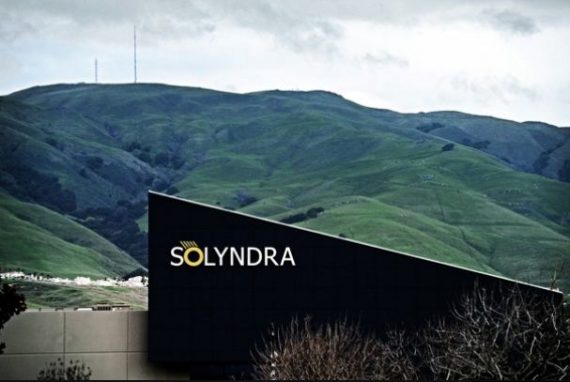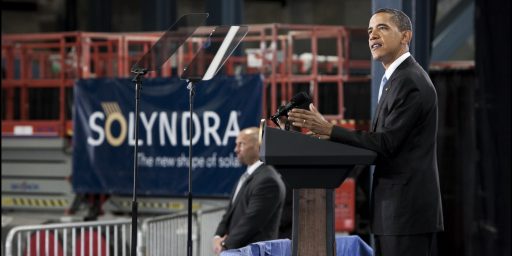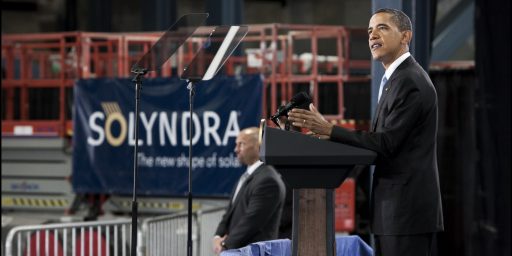Emails Reveal White House Pressure To Approve Solyndra Loan
Despite previous denials, the White House did in fact intervene in the approval process for a loan to Solyndra.
The media and Congressional investigations into the California solar power company Solyndra, which, received a $500 million federally guaranteed loan despite questions about its products viability, no history of ever making a profit, and warnings from analysts about the company’s stability are continuing to uncover evidence of what can only be described as an unusual amount of involvement by White House offices in the decision making process at the Energy Department. In today’s Washington Post, for example, Joe Stephens and Carol Leonning, report that the White House pushed the Energy Department to approve the loan quickly so that Vice-President Biden could announce its approval at a political appearance:
The Obama White House tried to rush federal reviewers for a decision on a nearly half-billion-dollar loan to the solar-panel manufacturer Solyndra so Vice President Biden could announce the approval at a September 2009 groundbreaking for the company’s factory, newly obtained e-mails show.
The Silicon Valley company, a centerpiece in President Obama’s initiative to develop clean energy technologies, had been tentatively approved for the loan by the Energy Department but was awaiting a final financial review by the Office of Management and Budget.
The August 2009 e-mails, released exclusively to The Washington Post, show White House officials repeatedly asking OMB reviewers when they would be able to decide on the federal loan and noting a looming press event at which they planned to announce the deal. In response, OMB officials expressed concern that they were being rushed to approve the company’s project without adequate time to assess the risk to taxpayers, according to information provided by Republican congressional investigators.
Solyndra collapsed two weeks ago, leaving taxpayers liable for the $535 million loan.
One e-mail from an OMB official referred to “the time pressure we are under to sign-off on Solyndra.” Another complained, “There isn’t time to negotiate.”
“We have ended up with a situation of having to do rushed approvals on a couple of occasions (and we are worried about Solyndra at the end of the week),” one official wrote. That Aug. 31, 2009, message, written by a senior OMB staffer and sent to Terrell P. McSweeny, Biden’s domestic policy adviser, concluded, “We would prefer to have sufficient time to do our due diligence reviews.”
White House officials said Tuesday that no one in the administration tried to influence the OMB decision on the loan. They stressed that the e-mails show only that the administration had a “quite active interest” in the timing of OMB’s decision.
“There was interest in when a decision would be made because of its impact on whether an event involving the vice president could be scheduled for a particular date or not, but the loan guarantee decision was merit-based and made by career staffers at DOE,” White House spokesman Eric Schultz said.
(…)
The White House pressure may have had a “tangible impact” on OMB’s risk assessment of the loan, the congressional investigators concluded.
In one e-mail, an OMB staff member questioned whether the review team was using the best model for determining the financial risk to taxpayers in evaluating the Solyndra deal.
“[G]iven the time pressure we are under to sign-off on Solyndra, we don’t have time to change the model,” the staffer wrote.
The emails also reveal another interesting fact. In August 2009, an Energy Department staffer involved in the review expressed concern about Solyndra’s cash flow problems, and noted that if the trend continued the company would run out cash in September 2011. The company shut down on August 31, 2011. Clearly, not only did the Energy Department know this company had problems, they could see exactly where it was headed, and they approved the loan anyway.
ABC News’s Brian Ross notes that the emails were uncovered in the course of an ongoing Congressional investigation but perhaps the most significant revelation today is the news that, at the same time these emails were going back-and-forth, independent analysts were issuing warnings about Solyndra:
Two months before Obama’s visit, accounting firm PricewaterhouseCoopers LLP warned that Solyndra, the recipient of $535 million in federal loan guarantees, had financial troubles deep enough to “raise substantial doubt about its ability to continue as a going concern.”
The Obama administration stood by Solyndra through the auditor’s warning, the abandonment of a planned initial public offering and a last-ditch refinancing where taxpayers took a back seat to new investors. That unwavering commitment has come under increasing scrutiny since the company’s travails culminated in its filing for bankruptcy protection on Sept. 6 and a raid on its headquarters by the Federal Bureau of Investigation two days later.
Before the revelation of these emails, the White House was saying that it didn’t intervene in the Energy Department’s loan approval process at all. What the emails reveal, however, is that the White House was putting time pressure on the loan reviewers so that approval could be announced at Vice-Presidential appearance that had already been scheduled, with the wesulting fact that staffers decided that they didn’t have time to take another look at Solyndra’s financial viability notwithstanding the warnings that were coming from outside analysts.
What it appears to me to have happened is that the Administration had already gone into the process with the pre-conceived idea that anything solar or “green” was per se good and that any evidence to the contrary about this particular company was simply ignored. Some are pointing to the political connections between the Administration and George Kaiser, who heads the Oklahoma-based Kaiser Family Foundation, one of Solyndra’s largest investors as evidence of what was going on. There doesn’t have to have been a quid pro quo here for something wrong to have gone on, though. Even if there’s no connection between campaign donations and the access that Solyndra was given to White House officials, there seems to be no question at all that Solyndra did have access to high-ranking White House officials that an ordinary solar energy start up most likely would have happen. Logically, that access most likely existed because one of their owners also happened to be one of the Obama 2008 campaigns biggest bundlers. That’s the definition of crony capitalism.
As I’ve said before, and as Tim Cavanaugh makes clear in an excellent piece over at Reason today, the Solyndra story isn’t really about something that’s unique to the Obama Administration. Instead, it points to a problem that’s endemic to Washington as a whole. First, there’s the whole issue of the kind of access that being a large campaign donor buys you. If George Kaiser had just been some entrepreneur from Oklahoma, it’s unlikely that top staffers in the White House would’ve given two hoots about the fate of Solyndra. The access, though, is only part of the problem. If the government wasn’t involved in giving guaranteed loans to companies that likely wouldn’t be able to get money in the private market, then the fact that George Kaiser was a “friend of Obama” really wouldn’t matter. The access becomes a problem when it leads politicians to do things that favor one company or industry over another, when it, to borrow a phrase from the President himself, “picks winners and losers.” That’s not a legitimate function of government. If Solyndra can survive in the free market, then it survives. If it can’t then that means that it wasn’t deemed to be a profitable enterprise. Instead of letting the market decide things, though, the Obama White House put its thumb on the scale and decided to hand over a half billion dollars in taxpayer dollars. That’s the real Solyndra scandal. It may be totally legal, but it’s not right.
There’s a broader story that Solyndra brings up as well, of course, and that’s the Obama Administration’s entire meme that “green jobs” would be the key to getting America out of the recession. That’s been the justification they’ve used for pushing things like the Solyndra loan, but the performance of the economy to date makes clear that they back the wrong horse. While the Solyndra story is unlikely to harm Obama politically in the way that some conservatives are probably dreaming, it is likely to deal a significant blow to the entire “green jobs” meme, which in turn makes the President’s promises about turning the economy around ring hollow.
Photo via The Washington Post







Solyndra, Gibson and Fast and Furious all at the same time.
Obama sure knows the Cloward Piven book. Overwhelm the system with corruption and make sure you have your brother Eric at the JustUs Dept helm.
Ooops…..
-Polaris
Unless you have Elmer Fudd on staff as an editor, I think you have a typo there.
I’m sure this thread will soon be populated with comments intended to be exculpatory. But I think I’m correct in saying there is only one private equity guy who comments on this site: me. And having done this for about 20 years now I can tell you unequivocally there is no excuse for what transpired. None.
Pick a word: capital cronyism; campaign donor payback; investment incompetance; breach of fiduciary duty………….
Fair enough. But for the thesis to carry any real weight, won’t you have to show that every instance of government assistance to a business has resulted in failure. Can you do that?
Just remember: Solyndra put in its application under the Bush administration, and the Bush people didn’t say no, so it’s all Bush’s fault.
J.
@Drew:
In the last days of the Bush regime his people said it was too risky!
@samwild:
That is a non-sequitor. Since a government can (because it can print money) keep a favored but failing company afloat indefinately (given sufficent political will), it doesn’t follow that all companies that receive govt assistance have will result in failure if failure is defined to be bankrupty. I’d consider GM a failure too, but since it technically didn’t go bankrupt (which btw rooked otherwise honest investors…bondholders many of which were middle class…out of needed returns in order to bypass bankruptcy laws), many here would disagree.
I think it’s more accurate to say that govt assistance can warp the market and allow a company to flounder and live longer than it should…to the determinent of everyone (including it’s own investors).
-Polaris
Energy Firms Aided by U.S. Find Backers@Polaris:
Or it can result in some successes: Energy Firms Aided by U.S. Find Backers
Whats the over/under on Solyndra posts by Doug?
I say seven.
How many do we have so far? I stopped counting at around 3.
Fair enough. Boo.
it points to a problem that’s endemic to Washington as a whole. First, there’s the whole issue of the kind of access that being a large campaign donor buys you. If George Kaiser had just been some entrepreneur from Oklahoma, it’s unlikely that top staffers in the White House would’ve given two hoots about the fate of Solyndra. The access, though, is only part of the problem. If the government wasn’t involved in giving guaranteed loans to companies that likely wouldn’t be able to get money in the private market, then the fact that George Kaiser was a “friend of Obama” really wouldn’t matter. The access becomes a problem when it leads politicians to do things that favor one company or industry over another, when it, to borrow a phrase from the President himself, “picks winners and losers.”
This is where I’m with the libertarians. I don’t have the same problem they do w/government spending. I do, however, have a problem with having the government betting on a particular company. Basic research, yes, I say. Infrastructure, yes. In both cases, the private sector can then come along and build off the groundwork.
So boo on the Obama administration for: a) corruption, however typical it may be; and b) being foolish. This will help the nutbars win (and, especially if Perry is the guy, the corporate cronyism will likely get even worse). Double boo.
When ideology (any ideology) trumps reason, matters always end in tears.
Doug points out, appropriately, that this is not just an Obama administration fiasco–it’s just one example of what happens when we don’t have sober grown-ups at the helm.
Rick Perry does not qualify as a sober grown-up, imho. Little Barry and his playmates certainly don’t.
@Jay Tea:
Wrong!
“The White House noted to ABC News that the Bush administration was the first to consider Solyndra’s application and that some executives at the company have a history of donating to Republicans.
The results of the Congressional probe shared Tuesday with ABC News show that less than two weeks before President Bush left office, on January 9, 2009, the Energy Department’s credit committee had voted against offering a loan commitment to Solyndra.
Even after Obama took office on Jan. 20, 2009, analysts in the Energy Department and in the Office of Management and Budget were repeatedly questioning the wisdom of the loan. In one exchange, an Energy official wrote of “a major outstanding issue” — namely, that Solyndra’s numbers showed it would run out of cash in September 2011.”
Read more: http://abcnews.go.com/Blotter/emails-obama-white-house-monitored-huge-loan-connected/story?id=14508865#ixzz1XwyMGfeQ
@Polaris:
But that’s prospective. I was asking an historical question. Have all the companies in the past that received government aid failed? As for warping the market, do you have any proof of that? Or is it an a priori truth that any government assistance warps the market? (Did DARPA warp the market when it facilitated the creation of the Internet? If so, what exactly was the market it warped?)
@OldSouth:
It’s less about being a grown up and more about incentives. Our whole political system is arranged around money. That’s just a fact.
I’ve long believed that even if you started out as a young idealistic public servant determined to improve things, by the time you got to the top you’d have been corrupted – and you would likely have rationalized your corruption away.
Shorter me: don’t hate the playa, hate the game. Our system produces this sort of result. It’s baked into the cake. And I don’t know how to fix it (w/o causing bigger problems, running afoul of the Constitution as currently intrepretted by the courts, or both).
@samwild:
The “picking winners & losers” thing – helping a specific company or industry (and not helping others) obviously warps the market. Whether you think that’s bad is another matter.
Solyndra is nothing more than the good old Chicago Pay to Play at work.
Remember where Obama came from and how many convictions there are for this type of game.
It wasn’t just that Solyndra got the money, which was risky at best. It was that they also got more favorable loan terms than any of the other solar companies that have received money under the DOE program. If that’s not the definition of crony capitalism, I don’t know what is.
Someone is going to go down for this. We just don’t know who it will be yet.
I will be the first to label Obama a LAME DUCK!
Adding to some of the comments about the
Bush Administration and the riskiness of the Solyndra project, made by Sam and Drew::
The bold parts of the above excerpt are mine, to highlight the troubling aspects of this deal for the Obama administration.
My understanding is that major investors, such as George Kaiser, will not be on the hook for their investment. It will be the taxpayer, through the loan guarantees that were hastily worked out between the government and Solyndra.
@Moderate Mom:
I bet it will be some scapegoat underling, and not any of the real upper administration guys on whose shoulders this deal-gone-awry will land!
Possibly the more damning time frame was the refi earlier this year. The government signed an agreement giving private investors preference over governmnet repayment in the event of a bankruptcy.
@PD Shaw:
Just like this regime screwed the bond holders at GM and rewarded the UAW with ownership of it.
@jan:
what is unusual about what you and I posted, it was an exclusive form ABC! Not Fox News which would have been slammed as propaganda by the Schultz, Sharpton and Madcow crowd.
I think you have the Obama administration on being naive and idealistic with respect to green energy, but where your case gets weak is when you go for the double, and try to also make it overt corruption.
Yes, the administration rushed to get poster-boy green projects in place.
(Maybe they did this when some of you were complaining about lack of shovel ready projects, and that stimulus would all come too late.)
@PD Shaw:
Yes, that stood out as red flag.
jan and Sam correctly point out:
“My understanding is that major investors, such as George Kaiser, will not be on the hook for their investment. It will be the taxpayer,”
The proper way to say that is not “on the hook,” but having a preference over taxpayers. (see below)
I have serious problems with the notion of government making venture picks. They simply are not competant to do so. I know this from 20 years experience. And if Barack Obama wants to do so perhaps he should co-sign the loan. I bet that would change his view rather quickly.
But the real sewer slime stuff here is the guarantee of the high risk loan and its lack of preference. Anyone with any facility with these matters knows cap structure pricing and preference in liquidation are key terms, and a fundamental fiduciary matter. From what I’ve seen, Kaiser got a wild sweetheart deal; equity in front of (cheap) debt. Never happens; never should happen. Plain and simple.
There is no legitimate rationale for that. None. Zip. Zero. Its simple corruption. jp’s (snicker) “independant” point of view notwithstanding.
@Drew:
If that’s true it’s good for impeachment, right?
(I don’t have a problem with the chips falling where they may, but I don’t really see the corruption charge made, yet.)
@Drew:
Accountability seems to generate more caution within individuals, when it’s their own finances on the line.
…and, yes, you did explain the financial arrangement of this deal better than I did.
@john personna:
I wonder what kind of findings it would take for you to entertain the idea there was corruption involved?
“If that’s true it’s good for impeachment, right?”
jp……………..as usual when caught red handed flapping his lips about something he knows nothing about – a common occurance – finds himself forced to resort to the absurd.
Some things never change.
jan –
There are none. He prances around as a “moderate” or “independant” but he’s a bald faced leftist.
But the real issue is proportionality. Throwing the country into a cataclysmic impeachment debate over a garden variety Chicago-style political payoff doesn’t make sense either. Just let this see the light of day and let the voters decide. One can only hope it will be pursued in the MSM so that can happen……………..and as for jp, let his ilk make bizarre exculpatory claims as they wish. He’s not to be taken seriously.
@Drew:
I agree.
Also, you’re so right about the absurdities of some of the responses around here. They either simply ridicule another poster, as if that is enough to put their dissent on political issues to bed; or they denounce other’s links as “right-wing,” even when such links are dealing with raw data taken from neutral sources; or they ask for endless ‘evidence’ to back up a post (then proceed to deny the authenticity of the source rendered); or they tack off course completely and bring up a red herring, deflecting the conversation entirely away from the issue being discussed — sort of like what personna was doing with you in bringing up impeachment, when the efficiency and honesty of Solyndra was what was being debated.
“sort of like what personna was doing with you in bringing up impeachment,”
Its a common occurance with him. You’ll see over time.
If you want a good belly laugh – or want to cry about the state of government decisionmaking – check out the testimony of DOE official Silver. Its on the net. Squirm. Obfuscate. Publicly humiliate yourself with absurd answers.
They were relying on a financial projection of a doubling of sales……while bleeding cash and no indication of a change in financial trajectory. When queried, he replied that he could not vouch for management’s numbers ( although he could vouch for making a subordinated loan.) Further, when asked if it made “common sense” for sales to double – what I like to call passing the “snicker test” – he had to crawl into his spider hole and mumble something about
“sales are not indicative of profits.” or some such. I’d have loved to have been the inquisitor and queried him on that assertion and the operating leverage characteristics of the business……….but that would have been cruel and unusual punishment.
You guys are accusing the President of crimes, and get upset when someone take you seriously.
What, you weren’t serious and just wanted to enjoy this as your tempest in a teapot for the day?
(Maybe I should thank you for walking this back to just “politics.” Lol.)
@Drew: It appears to me that an administration came to power disdainful of the judgments of the prior administration, with a situation which, according to Paul Krugman, necessitated massive government spending in circumstances in which it would be quite difficult to find sufficient spending. The administration pumped the gas pedal with a bunch of ideas rejected by the Bush administration; some may be good, some may vindicate Bush team, and some we may never know.
But it looks like earlier this year, a new infusion of capital was needed for Solyndra to keep afloat, and the Administration did not have the money or the will, but served over its prior investments rights to collect in the event of bankruptcy to private investors. I think act two is the interesting story. The project was failing and what to do . . .?
Yes, of course, because the brothers always stick together…just ask the Black Panthers…by the way, if this deal is so shady, why isn’t impeachment an appropriate remedy? What would the president have to do to warrant being impeached? Get a blowjob in the Oval Office, perhaps…
@An Interested Party:
These days after what both sides learned from Clinton? A Potus won’t be impeached even if caught smuggling convicted terrorists into DC if he (or she) has enough congressional partisan support to stop it.
Obama can’t be impeached and both sides know it. It would be political suicide to even consider it…no matter how deserved it may be.
-Polaris
@Drew:
I actually caught that video of Silver, and was amazed at his “common sense” reply.
@john personna:
Personna, you’re the one who brought up ‘impeachment.’ Drew reputiated that as being a waste of time. What was being discussed here was how badly the Solyndra was put together as a business model. It was doomed to fail from the beginning.
Ahh, so impeaching a president over something inconsequential has now rendered the impeachment process almost impossible to implement…I guess that’s what happens when a political party turns the impeachment process into a witch hunt used to settle a political score rather than using it as a legitimate way to punish a president for committing high crimes and misdemeanors…
@jan:
You’ve made this whole issue very boring.
@PD Shaw:
Kind of goes along with “guaranteeing the loan”.
The outrage machine has some good grist on this, but that particular bit is kind of specious, once you dig into the details.
The hearing is on CSPAN, and I encourage anybody with the time to watch it. There is much that the press is just regurgitating from politically charged sources.